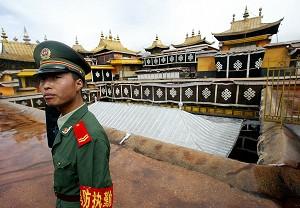LHASA—The Beijing Olympic torch relay began its Tibetan leg under tight security at Luobulinka, a traditional square where Tibetan mountaineer Googbu held the flame aloft.
Chinese Communist Party officials in charge of restive Tibet used the passing of the Olympic torch relay through the capital Lhasa on Saturday to defend their control and denounce the exiled Dalai Lama.
The torch procession ended under tight security below the towering Potala palace after having been run for just over two hours before a carefully-selected crowd, some three months after the region was convulsed by bloody anti-Chinese protests.
“We are convinced that the Beijing Olympic Games’ torch relay in Lhasa will further inflame the patriotic spirit of the people,” Lhasa’s Communist Party boss Qin Yizhi said at the opening ceremony, adding it would also help “smash the scheming of the Dalai Lama clique”.
The Beijing Games torch has never been far from controversy, and never more so than in its run through the streets of this 3,650-metre (12,000 feet) high city.
Police and troops lined the streets, carefully watching the groups of residents chosen to cheer on the torch. Groups of students from Lhasa University waved Olympic banners, the Chinese national flag, as well as the hammer and sickle banner of the ruling Communist Party.
But some students seemed hesitant in giving an answer when asked of the meaning of the torch passing through Tibet.
For many exiled Tibetans and human rights groups, the Lhasa torch relay serves as a reminder of China’s overbearing influence.
“This provocative decision–with the blessing of the International Olympic Committee –could aggravate tensions and undermine the fragile process to find a peaceful long-term solution for Tibet and the region,” said Human Rights in China Executive Director Sharon Hom.
Baima Chilin, a vice chairman of Tibet’s government, said supporters of the Dalai Lama, the exiled Tibetan Buddhist leader, wanted to upset the passage of the torch through the Lhasa, where protests and riots challenged Chinese control in March.
Clampdown ensures no protest
But he said he was sure the torch relay would not be troubled by protest, and called the relay a symbol of ethnic unity. “People of all ethnic groups in Lhasa greet the Olympic torch relay with immeasurable joy,” he told a news conference on Friday.
The rings of security surrounding the torch were a constant reminder that even the regime fears such joy is not universal.
The Lhasa relay has been drastically shortened from the 27 kilometres first planned to nine kilometres, and will have 156 torch bearers, including 75 ethnic Tibetans and 77 Han Chinese, Dekyi Drolkar of the regional sports authority said.
Matt Whitticase of the London-based Free Tibet Campaign, which supports self-determination for the region, said making phone calls into Lhasa had become increasingly difficult as authorities sought to clamp down on potential protest around the torch.





